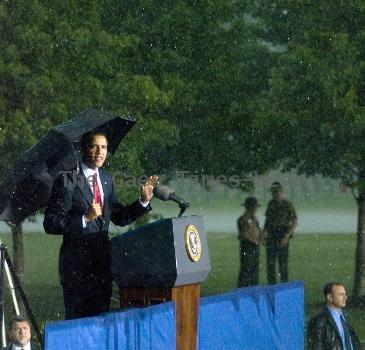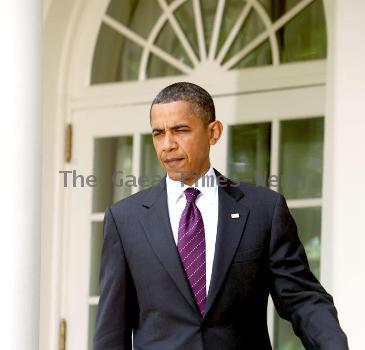US changes commanders in Iraq as final phase of American military involvement begins
By APWednesday, September 1, 2010
US changes military commanders in Iraq
BAGHDAD — The United States changed commanders in Iraq Wednesday, beginning the final phase of American military involvement in the country despite political uncertainty and persistent violence.
The transfer of authority came a day after President Barack Obama announced the shift from combat operations to preparing Iraqi forces to assume responsibility for their own security. Obama made clear in Tuesday’s speech that this was no victory celebration.
A six-month stalemate over forming a new Iraqi government has raised concerns about the country’s stability and questions over whether the leadership can cope with a diminished but still dangerous insurgency.
Newly promoted Army Gen. Lloyd Austin also maintained a somber tone as he took the reins of the some 50,000 American troops who remain in Iraq, with a deadline for a full withdrawal by the end of next year.
He noted “hostile enemies” continue to threaten Iraq and pledged that “our national commitment to Iraq will not change.”
“Although challenges remain, we will face these challenges together,” Austin said during the ceremony at the opulent al-Faw palace that was a former hunting lodge for ousted dictator Saddam Hussein.
Austin, who most recently served in Iraq as commander of troop operations from 2008-09, replaces Gen. Ray Odierno, who is heading to Virginia to take over the Joint Forces Command after a total of about five years in Iraq.
Vice President Joe Biden, Defense Secretary Robert Gates, and Joint Chiefs Chairman Adm. Mike Mullen presided over the ceremony, which was held at the main U.S. military headquarters on the southwestern outskirts of Baghdad.
Gates, visiting American troops in the Iraqi city of Ramadi Wednesday, said history will judge whether the fight was worth it for the United States.
“The problem with this war, I think, for many Americans, is that the premise on which we justified going to war turned out not to be valid,” he said. “Even if the outcome is a good one from the standpoint of the United States, it’ll always be clouded by how it began.”
Claiming that Saddam had weapons of mass destruction, then-President George W. Bush ordered the invasion with approval of a Congress that was still reeling from the 9/11 attacks. But Bush’s claims were based on faulty intelligence, and the weapons were never found.
Obama declared an end to combat in an Oval Office speech Tuesday night and praised American forces for their work. He acknowledged the ambiguous nature of the war in which American forces quickly ousted Saddam but were never able to fully control the Sunni Muslim insurgency against the Shiite-dominated establishment that even now threatens to re-ignite.
Still, he said the time had come to close this divisive chapter in U.S. history.
“We have met our responsibility,” Obama said. “Now it is time to turn the page.”
Avoiding any hint of claiming victory in a war he once called a major mistake, the president recognized the sacrifices of America’s military. More than 4,400 American troops and an estimated 100,000 Iraqis were killed and it cost billions of dollars.
Iraqi Prime Minister Nouri al-Maliki, a Shiite, said Tuesday the end of combat operations as a return to sovereignty and independence for the hobbled country, and tried to reassure his people that their own security forces can defend them.
Iraqi forces on Wednesday appeared to be on heightened alert, spread out at checkpoints across the city intended to reassure the populace and ward off insurgent attacks.
Just under 50,000 U.S. troops remain in Iraq — down from a peak of about 170,000 at the height in 2007. Those forces will not be able to go on combat missions unless requested and accompanied by Iraqi forces. The last combat brigade left Iraq earlier this month and the remaining units are being called advise and assist brigades by the U.S. military.
But drawing a line between what is and is not combat may not be easy. All American forces carry weapons, can protect themselves and their bases and still come under attack from insurgents near daily. Earlier this month, for example, Sgt. Brandon E. Maggart, 24, of Kirksville, Mo. Was killed near the southern city of Basra on Aug. 22 — a few days after the last combat brigade rolled across the border into Kuwait.
Iraq is also far from the stable democracy once depicted by the Bush administration and hoped for by Obama when he laid out his timeline for withdrawing American troops shortly after he took office in 2009.
Half a year has passed since Iraq’s March 7 elections which failed to produce a clear winner, and the country’s political leaders have so far failed to form a new government.
Anthony Cordesman, a former director of intelligence assessment in the Pentagon, warned in a new report that Iraq is at a critical time and its fate rests on a successful transition of power.
“The withdrawal is far from over, the Iraq war is not over, it is not ‘won,’ and any form of stable end state in Iraq is probably impossible before 2020,” Cordesman warned.
While Iraqis are generally happy to see the U.S. military pulling back, they also feel that the troop withdrawal is premature because security forces are a top target for militants. Iraqis also say they fear their country will revert to a dictatorship or split along religious and ethnic fault lines without U.S. military support.
“I hope that the American troops will leave Iraq, but not for the time being,” Baghdad resident Fadhil Hashim said Wednesday.
AP National Security Correspondent Anne Gearan in Ramadi and AP Writer Barbara Surk in Baghdad contributed to this report.
Tags: Baghdad, Barack Obama, Iraq, Middle East, Ml-iraq, North America, Troop Withdrawals, United States



